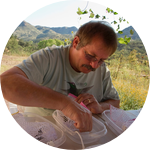About This Project
When hummingbirds hover they generate heat that must be lost to avoid overheating. At high temperatures, heat is eliminated is by evaporation. Previous work suggests that during hovering plumage might restrict evaporative heat loss. We will use a novel method to measure total evaporation in free-living hummingbirds. This work is important because hummingbirds are key pollinators that need to be active even at high temperature.
Ask the Scientists
Join The DiscussionWhat is the context of this research?
Hovering is vital to hummingbird foraging and pollination activity. At high temperatures (>36°C), heat can only be lost by evaporation. Evaporation occurs via respiration and across the skin (cutaneous). Earlier work suggests respiratory evaporation can dissipate <40% of heat produced during hovering. Thus, cutaneous evaporation is needed to compensate for extra heat produced. Cutaneous evaporation appears easily increased in resting birds, but preliminary data suggests that the aerodynamic form of plumage during hovering might restrict cutaneous evaporation. We propose to measure total evaporative heat dissipation over a range of temperatures to measure its ability to dissipate heat produced during hovering.
What is the significance of this project?
Mean global temperatures have risen every decade since 1970. In response, current climate models predict increasing extreme heats and are projected to adversely affect ecosystems, including ones where hummingbirds are major pollinators. This could prove challenging for hummingbirds. Studies suggest that some hummingbird climates are already sufficiently warm during the day to require evaporation to regulate body temperature. Because hummingbirds are key pollinators, their inability to function (hover) in ecosystems could reduce plant reproduction and ecosystem biodiversity. Additionally, hummingbirds are key indicator species and understanding how hummingbirds manage body temperature during these challenges will be valuable for planning ecosystem management strategies.
What are the goals of the project?
The primary goals of this project are:
1) To measure the ability of free-living hummingbirds to lose extra heat produced during hovering by evaporation when temperatures are high (>36 °C). We will do this using a novel method that has proven accurate in measuring respiratory evaporation in previous studies. We predict that during hovering the plumage will restrict evaporation.
2) To determine if hummingbirds increase nectar intake, and thus water intake, when temperature is high to support increased evaporation. Since hummingbird nectars are primarily water, we predict that when environmental temperature is high that hummingbirds will abandon their typical pattern of mass management and increase water consumption to support higher evaporation.
Budget
The purpose of this campaign is to complete our funding needs for the coming field season. The rental truck is necessary to get our field equipment from Oregon to Arizona. Many of the things we need in the field (e.g. cages, etc.) are too large to effectively ship, and some of our sensitive instruments simply do better when when transported in our own vehicle. The Southwestern Research Station fees are to provide room and board from Natalie and Sarah (both undergraduate students at George Fox University) during the project.
Endorsed by
 Project Timeline
Project Timeline
Research will be conducted at the Southwestern Research Station in the Chiricahua Mountains in SE Arizona. This site was selected because it offers a variety of hummingbirds that fill different ecological roles and provides a wide range of environmental temperatures. We will fly from Portland, OR to Arizona and then be transported by car to the research station. The research station will provide room and board, as well as necessary laboratory facilities.
Jan 30, 2018
Project Launched
Feb 02, 2018
Lab planning sessions to schedule training, weekly lab meetings, and prepare for field work.
May 04, 2018
Project Launched
May 18, 2018
Sarah Travels to Arizona for training on handling hummingbirds.
May 20, 2018
Natalie travels to the University of Montana to finish building her system for collecting evaporation data from hummingbirds.
Meet the Team
Donald R Powers
I am a Professor of Biology at George Fox University, and have studied various aspects of hummingbird physiology/ecology/biomechanics for nearly 40 years. My work on the energetics and biomechanics of hummingbird hovering, published in Nature in 2005, revealed important insights into the mechanics and evolution of this key hummingbird adaptation. In addition I have published numerous works that have added to our understanding of hummingbird energy management, flight metabolism, water regulation, evaporative water loss, and torpor. I am currently wrapping up a NASA-funded study of hummingbirds in both Arizona and Ecuador in which I explored how they will physiologically respond to increases in global temperature resulting from climate change. I received my B.S. degree in biology from Biola University, an M.S. in ecology from San Diego State University (advisor: Dr. George Cox), and a Ph.D. in physiological ecology from the University of California, Davis (Advisor: Dr. Wesley Weathers).
Sarah Thompson
I am from Oahu, Hawaii, and am currently attending George Fox University as a Biology major. I am looking forward to this research opportunity as it will provide a hands-on learning and challenge my critical thinking skills. This will be great preparation and experience for my post-graduate education as I hope to attend medical school.
Although I have always been school oriented, in the last few years, I have been able to explore and truly embrace the nature of Hawaii. This field research excites me as I will be able to not only learn from my professor and co-workers, but also have fun in a different environment with nature and science.
Natalie Amodei
I am a sophomore Biology major at George Fox University and I am excited to participate in research this summer to deepen my understanding of the scientific process and to prepare myself for a post-graduate education. I plan on attending medical school after George Fox and research experience will help to familiarize myself with the scientific community and engage in current studies to best serve future patients.
I am also studying Spanish which has given me to opportunity to travel and explore diverse cultures. I love learning and seeing new sights. This research opportunity will provide an incredible source of biological exploration and will enable me to immerse myself in a science and nature.
Project Backers
- 41Backers
- 100%Funded
- $2,752Total Donations
- $67.12Average Donation





